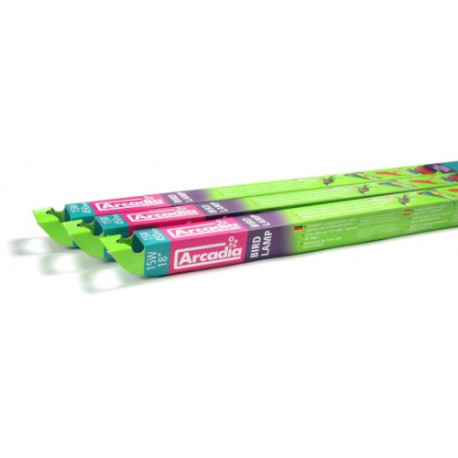



Reference: Arcadia8w300mm
The Arcadia Bird Lamp has been specially designed to provide captive birds with an artificial yet essential source of ultraviolet (UV) light.
Using a light source that mimics the UV content of the sun provides many benefits, including better health, and birds perceive their environment as they would in nature. The Bird Lamp promotes natural behaviour and often better reproduction.
Unlike standard fluorescent lamps, the Arcadia Bird Lamp uses phosphors that emit UV to mimic the sun's spectral distribution. 12% of the total output is emitted as UVA and 2.4% as UVB.
Using a light source that mimics the sun's UV content provides many benefits, including better health, and birds perceive their environment as they do in nature. The Bird Lamp promotes natural behavior and often better reproduction.
Unlike standard fluorescent lamps, Arcadia's Bird Lamp uses UV-emitting phosphors to mimic the spectral distribution of the sun.12% of the total output is emitted as UVA and 2.4% as UVB.
• Replicates UV exposure for domestic birds
• Provides vitamin D3 absorption
• Restores natural vision
• Available in linear version for aviaries or batteries
• Compact version designed for domestic cages
The Bird Compact Pro Bulb has been specially designed to provide captive birds with an artificial yet essential source of ultraviolet (UV) light.
Using a light source that mimics the UV content of the sun offers many benefits, including better health, and allows birds to perceive their environment as they would in the wild. This lamp promotes natural behaviour and often better reproduction.
Unlike standard fluorescent lamps, the Bird Compact Pro Lamp uses UV-emitting phosphors to mimic the sun's spectral distribution. 12% of the total output is emitted as UVA and 2.4% as UVB.
Lamp to control eggs.
This lamp is rechargeable and comes with a USB cable.
Magnifier with built-in light supplied with a storage case.
The Arcadia Bird Lamp has been specially designed to provide captive birds with an artificial yet essential source of ultraviolet (UV) light.
Using a light source that mimics the UV content of the sun offers numerous benefits, including better health, and birds perceive their environment as they would in nature. The Bird Lamp promotes natural behaviour and often better reproduction.
Unlike standard fluorescent lamps, the Arcadia Bird Lamp uses UV-emitting phosphors to mimic the sun's spectral distribution. 12% of the total output is emitted as UVA and 2.4% as UVB.
The light emitted by a fluorescent tube is reflected in all directions.
If a reflector is installed behind the tube, no brightness is lost; the rays are redirected towards the cage, and the tube's efficiency is then at its maximum.
The angle of the reflector can be adjusted to direct the light into the cage.
Maximise the light in your cages
Made from a robust aluminium design
Available in all lengths, from the NEW 6 W version to the 58 W version
Optimised reflectors for T8 and T5 lamps
Corrosion resistant.
The Bird Systems neon light has been specially designed to provide captive birds with an artificial yet essential source of ultraviolet (UV) light.
Using a light source that mimics the UV content of the sun offers many benefits, including better health, and birds perceive their environment as they would in nature. This neon light promotes natural behaviour and often better reproduction.
Unlike standard neon lights, the Bird Systems neon light uses UV-emitting phosphors to mimic the sun's spectral distribution. 12% of the total output is emitted as UVA and 2.4% as UVB.

The Arcadia Bird Lamp has been specially designed to provide captive birds with an artificial yet essential source of ultraviolet (UV) light.
Using a light source that mimics the UV content of the sun provides many benefits, including better health, and birds perceive their environment as they would in nature. The Bird Lamp promotes natural behaviour and often better reproduction.
Unlike standard fluorescent lamps, the Arcadia Bird Lamp uses phosphors that emit UV to mimic the sun's spectral distribution. 12% of the total output is emitted as UVA and 2.4% as UVB.
